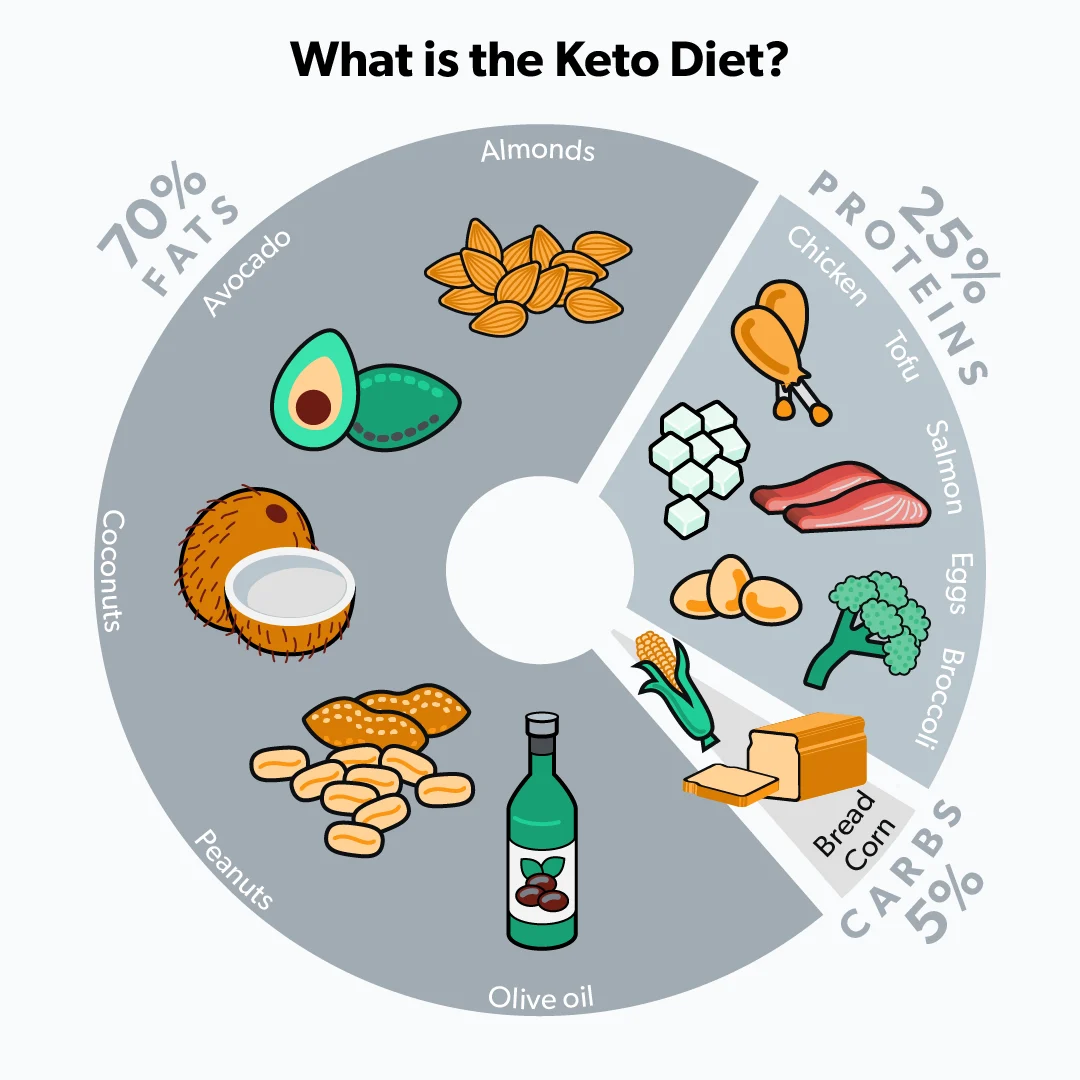Here's what we'll cover
Here's what we'll cover
Here's what we'll cover
Whatever the problem, someone is marketing a pill as the answer. That’s doubly true when it comes to health and body-weight concerns. So it’s not a surprise that there are many “advanced keto pills” and other keto-supplement products that claim to help your body burn fat, boost energy, and support your overall wellness through ketosis.
If you’ve arrived here, you probably have a good idea about what ketosis is. Whether you do or don’t, we’ll get into the details a little later on. For the time being, here’s a demi Tweet-length definition: ketosis is what happens to your body when it can’t get its energy needs met by carbohydrates and starts making ketones to use as fuel instead.
There are five FDA-approved pills for long term use for weight loss (NIDDK, 2016). None of them have anything to do with keto. However, some research has found that some keto-pill ingredients may support or enhance ketosis. They may also aid weight loss or improve your energy levels, though the jury’s still out.
The different types of keto pills and supplements
There are countless keto pills, powders, and other supplements for sale.
They are all sources of exogenous ketones—meaning that they originate from outside of the body and are not made by the body—including keto salts. Keto salts are usually a mixture of electrolytes such as potassium and magnesium, minerals such as calcium, and keto compounds like beta-hydroxybutyrate (BHB). BHB is one of the ketone bodies that your liver makes and uses for energy when you’re in ketosis (Newman, 2017).
Most of the work on ketone salts and ketone supplements has examined the effect of BHB salts. But some products may contain other compounds that aim to support ketosis. Two that turn up are 1, 3-butanediol and 1, 3-butanediol acetoacetate diester (Kesl, 2016).
Different products contain different types and amounts of these BHB ketones and other keto compounds. When it comes to naming the best keto diet pills, hard evidence is hard to come by.
What keto pills do
The makers of many keto diet pills claim that their supplements can help your body get into or maintain ketosis. And there’s evidence that some of these supplements actually deliver.
A small 2021 study found that taking ketone salts “enhanced” ketosis in a group of men and women on the ketogenic diet (Buga, 2021). Another small study, published in 2017, involved people who were not on a ketogenic diet. It found that people who swallowed drinks containing ketone salts upped their blood’s levels of circulating ketone bodies (Stubbs, 2017).The keto salts in both studies contained BHB. And it makes sense that swallowing BHB could improve BHB levels in your blood. However, some researchers have concerns that in order to sustain high blood levels of BHB through supplements could be harmful because of the excessive salt load (Newman, 2017).
More work—nearly all of it in rats—looked at supplements containing some of the other ketone bodies. Again, this work found that swallowing these supplements supported ketosis (Kesl, 2016).
But do keto pills work?
That depends on how you define “work.”
The 2021 study we mentioned earlier found that swallowing a BHB supplement for six weeks enhanced ketosis in a small group of people who were already on a keto diet. However, this boost did not lead to any measurable health improvements like weight loss when compared to people who followed a ketogenic diet but did not take a BHB supplement (Buga, 2021).
Meanwhile, the 2017 study found that taking a BHB supplement lowered a person’s blood levels of unhealthy triglycerides and fatty acids. While that’s encouraging, the study only looked at the effect of a BHB drink over the course of a single day. It didn’t explore whether taking a keto supplement for weeks or months would offer any health effects, good or bad (Stubbs, 2017).
When it comes to weight loss, there’s some promising animal research that suggests these compounds can help burn body fat. Both rats and mice fed keto supplements lost weight (Poff, 2019; Kesl, 2016).
The bottom line: so far, there’s no evidence that people who take keto pills or supplements alone lose weight or that adding these to the keto diet leads to extra weight loss or keto burn.
Are keto pills safe?
Many supplements come with risks or side effects. Some of these issues show up immediately. But sometimes, they may not surface for months or years (Middha, 2019). The good news is that, so far, the research on keto supplements hasn’t turned up any serious health risks or side effects. However, ketone salts are usually made up of ketones bound to sodium, so those with high blood pressure who need to keep their salt intake in check should check in with a healthcare provider before taking keto supplements (Buga, 2021; Newman, 2017).
But it’s important to understand that diet supplements—including keto pills—are not well-regulated. There are far, far too many products on the market for authorities to track. And even when regulators are paying close attention, they’re usually looking for immediate risks or side-effects—not long-term health issues (Starr, 2015).
Almost any supplement can come with unexpected hazards. Be sure to talk with your healthcare provider before taking something you’re not sure about.
So what is the keto diet?
Your body typically uses glucose for energy. It gets most of its glucose from the carbohydrates in food. Stop eating carbs, and your body has to find other metabolic sources of energy (Masood, 2020).
Ketones (also known as ketone bodies) are your body’s main alternative energy source. It makes ketone bodies in part by breaking down its own stores of fat and fatty acids. Fatty foods, and also protein-rich foods, can help your body make ketone bodies (Masood, 2020).
When your system switches to ketone bodies as its main energy source, this is called “ketosis” or a “ketogenic state.” The goal of the keto diet is to make this switch. You can do this by limiting your daily intake of carbs to just 5% or 10% of your total calories. Fatty foods should account for the bulk of your calories—or 55% to 60% of your diet—while protein makes up the rest (Masood, 2020).

What are the benefits of a keto diet?
Some research has found that keto diets can help people lose weight.
For a 2019 study in the journal Nutrition Research, 35 adults with obesity switched to a keto diet. After three months, the men in the study had dropped an average of 40 pounds. Meanwhile, the women in the study lost 24 pounds (Mohorko, 2019).
More research—some on keto diets specifically, and others on very-low-carb plans (which is basically what keto is)—have also led to good results (Ludwig, 2021). Those studies are exciting, but they’re not conclusive (Trimboli, 2020). Looking beyond weight loss, there’s also some work showing that keto diets may lower your risk for Type 2 diabetes and heart disease (Masood, 2020) and may be protective against Alzheimer’s and other brain diseases (Ludwig, 2021).
Is the keto diet safe?
There’s always going to be some risk associated with diets that cut out or limit whole food groups. And that includes keto. If you’re not careful, keto eating can lead to nutritional deficiencies. But the research so far suggests that keto diets are safe (Ludwig, 2021).
One of the ongoing concerns about keto diets is that it eliminates whole-grain foods. These are associated with a lot of health benefits, like a lower risk for cancer and other chronic diseases. But there again, the evidence is mixed. It’s not clear that people who avoid carbs—even apparently healthy carbs like whole grains—are worse off (Ludwig, 2021).
It’s not clear whether keto pills are worth adding to your health regimen. For now, the research is encouraging—but not conclusive.
DISCLAIMER
If you have any medical questions or concerns, please talk to your healthcare provider. The articles on Health Guide are underpinned by peer-reviewed research and information drawn from medical societies and governmental agencies. However, they are not a substitute for professional medical advice, diagnosis, or treatment.
References
Buga, A., Kackley, M. L., Crabtree, C. D., Sapper, T. N., Mccabe, L., Fell, B., LaFountain, R. A., Hyde, P. N., Martini, E. R., Bowman, J., Pan, Y., Scandling, D., Brownlow, M. L., O'Connor, A., Simonetti, O. P., Kraemer, W. J., & Volek, J. S. (2021). The Effects of a 6-Week Controlled, Hypocaloric Ketogenic Diet, With and Without Exogenous Ketone Salts, on Body Composition Responses. Frontiers in nutrition, 8, 618520. doi: 10.3389/fnut.2021.618520. Retrieved from https://www.frontiersin.org/articles/10.3389/fnut.2021.618520/full
Kesl, S. L., Poff, A. M., Ward, N. P., Fiorelli, T. N., Ari, C., Van Putten, A. J., Sherwood, J. W., Arnold, P., & D'Agostino, D. P. (2016). Effects of exogenous ketone supplementation on blood ketone, glucose, triglyceride, and lipoprotein levels in Sprague-Dawley rats. Nutrition & metabolism, 13, 9. doi: 10.1186/s12986-016-0069-y. Retrieved from https://nutritionandmetabolism.biomedcentral.com/track/pdf/10.1186/s12986-016-0069-y.pdf
Ludwig D. S. (2020). The Ketogenic Diet: Evidence for Optimism but High-Quality Research Needed. The Journal of nutrition, 150(6), 1354–1359. doi: 10.1093/jn/nxz308. Retrieved from: https://academic.oup.com/jn/article/150/6/1354/5673196
Masood, W., Annamaraju, P., & Uppaluri, K. R. (2020). Ketogenic Diet. In StatPearls. StatPearls Publishing. Retrieved from https://www.ncbi.nlm.nih.gov/books/NBK499830/
Middha, P., Weinstein, S. J., Männistö, S., Albanes, D., & Mondul, A. M. (2019). β-Carotene Supplementation and Lung Cancer Incidence in the Alpha-Tocopherol, Beta-Carotene Cancer Prevention Study: The Role of Tar and Nicotine. Nicotine & tobacco research : official journal of the Society for Research on Nicotine and Tobacco, 21(8), 1045–1050. doi: 10.1093/ntr/nty115. Retrieved from https://www.ncbi.nlm.nih.gov/pmc/articles/PMC6636175/
Mohorko, N., Černelič-Bizjak, M., Poklar-Vatovec, T., Grom, G., Kenig, S., Petelin, A., & Jenko-Pražnikar, Z. (2019). Weight loss, improved physical performance, cognitive function, eating behavior, and metabolic profile in a 12-week ketogenic diet in obese adults. Nutrition research (New York, N.Y.), 62, 64–77. doi: 10.1016/j.nutres.2018.11.007. Retrieved from https://pubmed.ncbi.nlm.nih.gov/30803508/
National Institute of Diabetes and Digestive and Kidney Diseases (NIDDK)- Prescription Medications to Treat Overweight and Obesity. (2016, July). Retrieved May 14, 2021, from https://www.niddk.nih.gov/health-information/weight-management/prescription-medications-treat-overweight-obesity
Newman, J. C., & Verdin, E. (2017). β-Hydroxybutyrate: A Signaling Metabolite. Annual review of nutrition, 37, 51–76. doi: 10.1146/annurev-nutr-071816-064916. Retrieved from https://www.ncbi.nlm.nih.gov/pmc/articles/PMC6640868/
Poff, A., Koutnik, A., Moss, S., Mandala, S., D'Agostino, D. (2019) Exploring the Viability of Exogenous Ketones as Weight Loss Supplements. Current Developments in Nutrition, Volume 3, Issue Supplement_1, June 2019, nzz041.P21–017–19. doi: 10.1093/cdn/nzz041.P21-017-19. Retrieved from https://academic.oup.com/cdn/article/3/Supplement_1/nzz041.P21-017-19/5517524
Starr R. R. (2015). Too little, too late: ineffective regulation of dietary supplements in the United States. American journal of public health, 105(3), 478–485. doi: 10.2105/AJPH.2014.302348. Retrieved from https://www.ncbi.nlm.nih.gov/pmc/articles/PMC4330859/
Stubbs, B. J., Cox, P. J., Evans, R. D., Santer, P., Miller, J. J., Faull, O. K., Magor-Elliott, S., Hiyama, S., Stirling, M., & Clarke, K. (2017). On the Metabolism of Exogenous Ketones in Humans. Frontiers in physiology, 8, 848. doi: 10.3389/fphys.2017.00848. Retrieved from https://www.frontiersin.org/articles/10.3389/fphys.2017.00848/full
Trimboli, P., Castellana, M., Bellido, D., & Casanueva, F. F. (2020). Confusion in the nomenclature of ketogenic diets blurs evidence. Reviews in endocrine & metabolic disorders, 21(1), 1–3. doi: 10.1007/s11154-020-09546-9. Retrieved from https://pubmed.ncbi.nlm.nih.gov/32080796/










